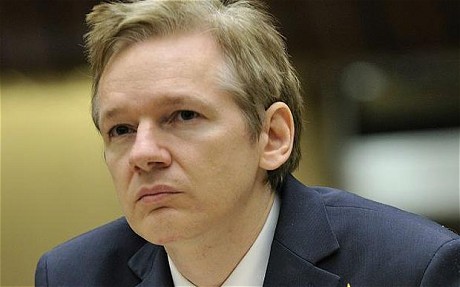
The greatest American hero may not even be an American.
It is hard to overestimate the importance of WikiLeaks, already perhaps the most controversial website in the history of the relatively fledgling Internet. If you’ve been near any source of either news or Internet, you’re aware of the fact that said site, despite enduring a brazen and blatantly government-sponsored hack-attack, has released almost innumerable documents from the American diplomatic corps to the world at large. And the results are shocking.
Or they would be shocking, were there not a sort of open understanding that the duplicity, underhandedness, and overt dishonesty ubiquitous throughout the documented correspondence was par for the American course. Or suspected to be so, wherein lies a key significance in WikiLeaks’ recent release. While most of us have long assumed that America’s far-flung diplomats are spies in pretty suits, we haven’t known this. And perhaps most importantly, we haven’t known that they will openly and flagrantly admit it when behind closed doors. But now we do. Now the whole world does.
The reason America conducts such horrendously disingenuous “diplomacy” with foes and allies alike, collecting information to hoard, privately manipulate, and release in spun nuggets destined for spoon-fed genetically-modified consumption, is because it can. One could argue that I’m picking on America and that everyone conducts their diplomacy this way. Possibly, to an extent. One could argue that the only thing that makes America different is its collected disparity in power and expected influence makes its scale of magnitude greater, but its kind of actions no different. Perhaps.
But again, there is an essential significance in whether the American government itself, those conducting the double-dealing and shady gunboat work, believe they are different. And here I think it’s obvious that they do. I doubt anyone feels that America is just another run-of-the-mill realpolitik power broker arranging blandly predictable self-interest while they churn through a brief few years in the limelight before an inevitable decline. Anymore than I believe that every politician who feels compelled to punctuate their stump speeches with references to America as the greatest country that ever was, is, or will be thinks that they’re just spouting platitudes. I genuinely feel most agents of American power believe in the ideas they claim to espouse, be they American supremacy in the form of dominance, moral superiority, or even advanced idealism and inspiration.
And thus WikiLeaks is essential in breaking the myth. In holding the mirror up to our little self-important empire gone mad and forcing us to take a good long look. The fallout of the latest WikiLeaks release is almost incalculable – indeed most press outlets who’ve read and are slowly releasing the information therein are tripping over themselves to report on how many negotiations may radically shift, jobs may be lost, positions compromised, dinner table conversations become decidedly more awkward. In their rush to speculate on all these changes, they’ve overlooked perhaps the most impressive accomplishment so far, which is restoring the dignity and sanctity of the fourth estate back to itself. Suddenly the press is reporting real news. Not manufactured droplets of distilled calculus, but actual raw opinions and facts as gleaned from primary sources. The Internet has not eclipsed the mainstream press; it has saved it.
On a broader level, what WikiLeaks signals (in conjunction with other elements of a free Internet) is a whole new rubric for evaluating life, leadership, and the aim of society. Much hand-wringing and neck-scratching has been displayed in reaction to the fear of ever-shrinking privacy that the Internet writ large portends, and WikiLeaks is surely the fire-tinged spearhead of that movement, slicing straight to the heart of our most divine of private bovines, the National Security files. But what people forget about Big Brother and the symbolic warnings of privacy-loss of our past is that they were laden with information imbalances. Big Brother did not broadcast everyone’s true thoughts and feelings, including high government ministers and Big Brother himself, on a full-screen wall in each person’s apartment. Big Brother was a receptacle for information, a collector, but refused to divulge anything except the most specialized and crystallized fact-bites designed to mislead people and maintain order. Indeed, the disappearance of most individuals was never reported, nor were the true mathematical data that indicated the society’s decline, let alone any reality of history. Truth was monopolized by the government for its own private functions.
Contrast this with the kind of world that the Internet and WikiLeaks are foreshadowing. Where the government is no more illuminated a place than the average computer screen in any given home (or out on a park bench). Where the public has just as much information about the private dealings of their representative or diplomat or executive leader as said person has about them. Maybe more, given the increased scrutiny commensurate with such an individual’s position. Where the age-old question of “who guards the guardians?” is answered with unanimous assent.
Yes, we may all be a bit up in each others’ business and there may be a tinge more trouble with narcissism and navel-gazing. But in exchange for this, we get a government and a society not dependent on duplicity to grease the wheels of interaction. Instead, ideas and thoughts are exchanged honestly, and one’s private misgivings and dalliances will be shared, one way or the other, enabling a freer, more honest form of communication from the beginning. Ranging from the everyday personal encounter all the way up to the highest-level negotiations between governments, businesses, and the public they allegedly serve. It is hard to imagine the flimsy Bush-administration falsifications that justified opening the Iraq War standing up to a foe like WikiLeaks. Privacy begone!
There are only two salient arguments I’ve fielded against this kind of busting open the doors of what most people consider a right (though one whose only alleged enshrinement in the Constitution was constructed for the purpose of allowing abortion in an intellectually dubious fashion). One is that it will create a culture of shaming where people feel bad about things they shouldn’t feel bad about. For example, if you can’t hide the fact that you’re gay in Alabama, you will face undeserved recrimination. The problem here, of course, is that you’ll also know how many closeted bigots in Alabama are also hiding the fact that they’re gay, despite preaching regularly to the contrary or heading to Washington to pass hypocritical legislation. In a culture without privacy, objections to reasonable human proclivities would dry up pretty quickly when it became blatantly obvious how many skeletons people had shacked up in their own back rooms. Will there still be recrimination for people making actually bad decisions in their past? Sure. But should there be? Of course. And if you prefer forgiveness and “starting fresh”, odds are that enough people will have blemishes on their pasts to want to create a certain limit on how much shame they’re going to toss on everyone else. Which will make it a lot like current society, but with a lot less anxiety, hiding, and waiting for shoes to drop. And perhaps a little more human understanding.
The other argument is that there are just some innately private things that are “icky” like copulation or using the bathroom and there’s no need to broadcast these things. Fair enough. Sure. That’s true. But honestly, if that’s the only drawback and in exchange we never again go to war under false pretenses or are lied to by our supposed friends and confidants? I’ll take it. There’s also probably a reasonable moratorium that people could self-regulate on overly icky things anyway, as long as they weren’t cloaking the essential moral facts of whatever ickiness they were up to.
So, honestly, what’s not to like? Give me a reason to fear Julian Assange and his small collection of truly heroic risk-takers and whistleblowers leading us into a new age of information without limit or secrecy. Maybe you like America more than most prior global superpowers, you fear that our shameful decline ushered in by the exposure of blinding hypocrisy will yield to a force with tighter clamps on human freedom. Perhaps, I guess, but I’m starting to think this movement, centered around the Internet, is a bit like Pandora’s box. I don’t think anything’s going back in. I have a running debate with some of my friends about whether there’s a way to effectively shut down the web, and while I think there somehow must be, it’s hard to imagine it working in any top-down way. The best way to kill the Internet has already been tried – cluttering it up with the same drivel and nonsense that clouds the mainstream media and the day-to-day perspective of most of its users. Distract with stories of celebrity and excess while the real deeds go down. Replace blogs with Facebook and Facebook with Twitter and Twitter with something that only allows you to express yourself in a 10×10 pixel graphic.
WikiLeaks isn’t just a possible antidote to that – it is the one all-encompassing cure. With one large transmission of information, it blows the cover off all the distraction, replaces soft news with something very real, and overloads byte-limits with one of the single largest information dumps in human history. One could spend a lifetime absorbing the information in this release alone. No doubt, someone will.
While they’re doing that, our country will be making an all-important choice. Either adapt and change, accepting a more limited range of power in exchange for making good on some of the initial promises of its alleged ideals. Or fight to the death for a world that is disappearing and take its place amongst failed empires and head-cases of the past.
The choice, at least in some small part, is all of ours.


